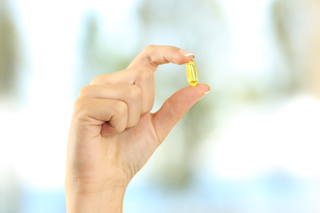
Sufficient vitamin D levels requires more than a healthy diet and taking supplements—good vitamin D levels need the right cofactors too. A shocking three-quarters of the US population has too little vitamin D, even in sunny locales. Vitamin D is necessary to dampen inflammation and tame autoimmune diseases. Some people with autoimmunity may even need extra vitamin D due to a genetic variation that affects the ability of their cells to absorb adequate vitamin D.
In addition to supplementing with fat-soluble vitamin D (cholecalciferol), make sure you are getting the right cofactors, or “helper molecules” that assist in the biochemical transformations required by vitamin D.
These include fat-soluble vitamin A, magnesium, and K2, which make vitamin D more bioavailable and help prevent D overload.
Vitamin A and vitamin D work together to make sure your genetic code functions appropriately. There are two main types of vitamin A:
- Beta-carotene, found in brightly colored fruits and vegetables, apricots, mango, and leafy greens.
- Retinol, found in organ meats and dairy products.
You can take vitamin A in supplement form as both beta-carotene and retinol, however retinol is the more active form. Although it’s also possible to take too much retinol. Your body can’t get rid of it easily, which can be harmful.
Magnesium. You can obtain sufficient magnesium through food, but high doses of vitamin D3 deplete magnesium. If you are already low in magnesium and supplement with vitamin D, supplementing with magnesium may avoid headaches, cramping, nausea, numbness and more that may accompany high doses of D3.
The Vitamin D Council recommends 500–700mg of magnesium per day. Supplement sources include magnesium glycinate, magnesium citrate, and magnesium malate. Each has unique effects, so consult with my office to learn which is right for your needs.
Magnesium-rich foods include dark leafy greens, potato, beans, lentils, avocado, bananas, figs, strawberries, blackberries, nuts, seeds, brown rice, and dark chocolate.
Vitamin K2. Vitamin D toxicity can cause soft tissue to accumulate calcium and calcify like bone. In contrast, sufficient vitamin D i may even protect against calcium deposits in arteries.
Vitamin K2 is an important cofactor for vitamin D to help the body deposit calcium in appropriate locations such as the bones and teeth, and to prevent calcium from depositing where it doesn’t belong, such as the soft tissues, arterial walls, joints and organs.
Healthy gut bacteria are necessary to convert vitamin K1 to the more active form K2. However, we can supply our K1 needs through eating cabbage, kale, spinach, chard, green leafy vegetables, broccoli, cauliflower, Brussels’ sprouts, and sauerkraut. These foods will also promote healthy gut bacteria.
The National Academy of Sciences recommends 90mcg of K2 for women and 120mcg for men.
However, Osteoporosis International recommends 180 mcg a day of K2 as MK-7.
If you take blood thinning medicines such as Warfarin or Coumadin, vitamin K supplements can affect how well your blood clots, so please talk to your doctor.
Testing
Checking your vitamin D level periodically can help you improve your health if you suffer from chronic illness.
In functional medicine we measure vitamin D levels with a serum 25-hydroxy vitamin D test. Optimal levels are between 50 and 80 ng/mL.
If you suffer from leaky gut or autoimmunity, you may be more prone to a genetic vitamin D deficiency, so make sure to pay attention to this vital vitamin.



Latest from the Blog
The Dirty Dozen
August 19, 2024The “Dirty Dozen” is a list of fruits and vegetables, compiled by the Environmental Working Group (EWG), that you should always eat organically. These produce items are not only delicious and nutrient-rich but also tend to carry high levels of pesticide residues when grown conventionally. By opting for organic versions, you can significantly reduce your […] Read more
Latest from the Blog
3-Day Detox Plan
Here’s a 3-day detox meal plan tailored to be autoimmune-friendly and compliant with functional medicine principles. This plan emphasizes anti-inflammatory, nutrient-dense foods while avoiding common triggers for autoimmune symptoms. Day 1 Breakfast: Green Smoothie Bowl Ingredients: Spinach, kale, cucumber, green apple, avocado, coconut milk, chia seeds. Why: Spinach and kale are rich in vitamins A, […] Read more